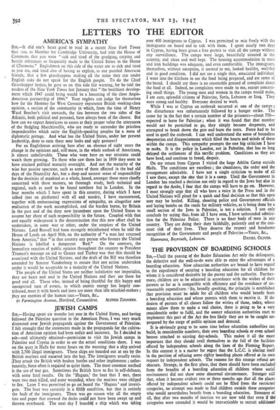THE PROVISION OF BOARDING SCHOOLS
SER,—Until the passing of the Butler Education Act only the delinquent, the defective and the well-to-do were able to enjoy the advantages of a boarding education. Now education authorities are bound to have regard to the expediency of securing a boarding education for all children for whom it is considered desirable by the parent and the authority. Further- more, children are to be educated in accordance with the wishes of their parents so far as is compatible with efficiency and the avoidance of un- reasonable expenditure. • So, broadly speaking, the principle is established that provision must be made de for all children who would benefit from a boarding education and whose parents wish them to receive it. If the desires of parents of all classes follow the wishes of those, today, whose means allow them to make a real choice, there is going to be a very considerable order to fulfil, and the sooner education authorities start to implement this part of the Act the less likely they are to be caught un- prepared by the surge of public opinion and demand. It is obviously going to be some time before education authorities can build, in considerable numbers, their own boarding schools or even school houses attached to existing day-schools. This makes it all the more important that they should avail themselves to the full of the facilities offered by independent schools along the lines of the Fleming Report. In this context it is a matter for regret that the L.C.C. is placing itself in the position of refusing some eighty boarding places offered at its own request by independent schools. The reasons for this strange refusal are obscure. Strange, in the first place, that there should have been excluded from the benefits of a boarding education all children whose social environment did not show some abnormal circumstance. Stranger still that, when it became evident two or three months ago that all the places offered by independent schools could not be filled from the restricted categories, no attempt was made to find children outside these categories who would nevertheless benefit from a boarding education. Strangest of all, that after two months of inaction we are now told that even if the categories were extended it would be impracticable to recruit additional children for the available places in time for admission next September. Through the mist of motive only the outcome is plain. The door of opportunity is being slammed in the face of eighty London schoolchildren.



































 Previous page
Previous page